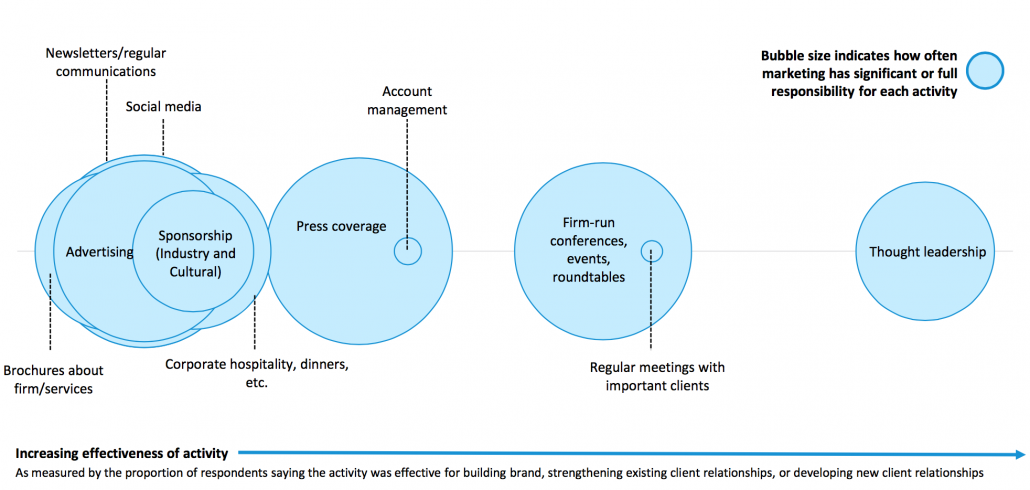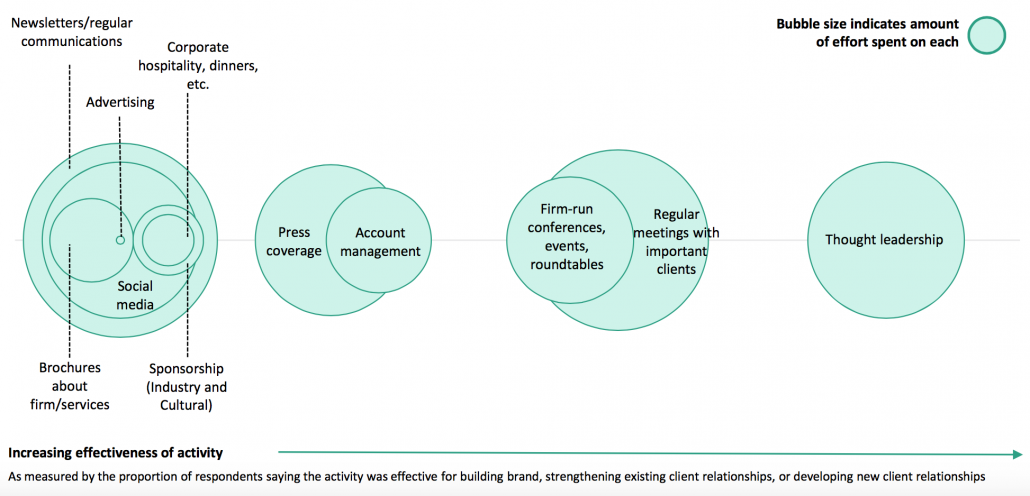Part 2: The current role of marketing in professional services firms
3 min read
Before re-defining the role of marketing in professional services firms, it is worth looking at the current role of marketing individuals in those firms. Why are they currently doing little to change the views held by sceptical partners that they are nothing more than ‘functionaries’?
The diagram below taken from a recent Source Global Research publication,[1] shows the amount of effort spent by a firm (not just marketing) on different marketing activities and the effectiveness of each activity.
In short, respondents[2] believe marketing teams spend a significant amount of time working on marketing activities that add little value to the firm (as shown on the left of Fig.1 below).
These marketing activities are regularly found as part of a traditional marketing toolkit and include: advertising, brochures, PR, newsletters, events management and logistics, communications, social media, conferences, mailshots, emails, corporate hospitality.
Quite a bit of time is invested in regular meetings with important clients but it is usually non-marketing individuals who undertake this activity.
The conclusion from the diagram’s author is damning: “effort looks indiscriminate at best and ineffective at worst.”[3]
Fig 1. Marketing work on activities that add little value to the firm
Image from Source Global Research “Marketing in consulting firms: A two-tier society” – link here 2016 p.6
Fig 2. Marketing have most control over the things that matter least
Depressingly for those currently working in marketing, the report finds that marketing teams in professional services firms have most control over the things that matter least:

Image from Source Global Research “Marketing in consulting firms: A two-tier society” – link here 2016 p.5
Other roles typically undertaken by marketing teams but not included in the diagram above might include: website updates and maintenance, managing the CRM system, ordering stationery and business gifts, attending networking events and submitting awards entries. Marketing Managers might also be expected to produce and monitor marketing budgets, create and manage lists of targets/prospects/clients, draft tender responses and prepare and present sales figures.
Perhaps with the exception of the Marketing Manager tasks outlined above, we believe you are also likely to find many of these additional marketing activities towards the left hand side of Fig.2.
In Part 3 of our Special Report, we redefine the role of marketing in a professional services firm.
Professional Services Marketing is Dead; Long Live Professional Services Marketing:
Part 1. The Challenges Facing Marketing Teams in ‘traditional’ Professional Services Firms
1. The attitudes of partners, principals and fee-earners towards marketing
2. ‘Traditional’ marketing toolkit activities are not as relevant and add less value in professional services
Part 2. The Current Role of Marketing in Professional Services Firms
1. Marketing work on activities that add little value to the firm
2. Marketing have most control over things that matter least
Part 3. Redefining the Role of Marketing in a Professional Services Firm
– A ‘Consultant’ to the Partner/Fee-earner group
– The new roles of professional services marketers
Part 4. The ‘Hidden Curriculum’ of Professional Services Marketing
– Redefining the professional services marketer’s skill set
– The ‘Hidden Curriculum’
Part 5. Conclusion: Professional Services Marketing at a Crossroads
– Next steps for marketing teams and professional service firm leaders
References:
[1]Source Global Research “Marketing in consulting firms: A two-tier society” 2016 p.6
[2] The Source Global Research report was based on the views of marketers from 30 consulting firms working predominantly in the United States (38{1b8db7b714ce7312953586b5b3bb16e0e10a9e3b7c2029e0b2e6b86cd4259a3a}) and the UK (30{1b8db7b714ce7312953586b5b3bb16e0e10a9e3b7c2029e0b2e6b86cd4259a3a}). Firms sampled included Big Four firms, top-tier strategy firms, technology firms, HR firms, and a wide range of small and mid-sized specialists.
[3]Source Global Research “Marketing in consulting firms: A two-tier society” 2016 p.6




